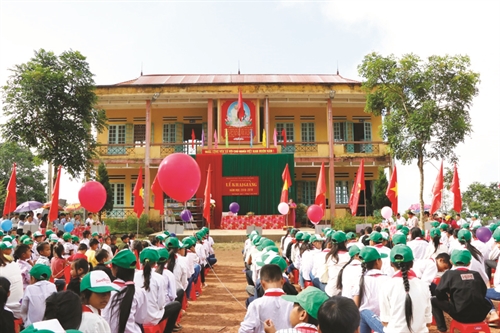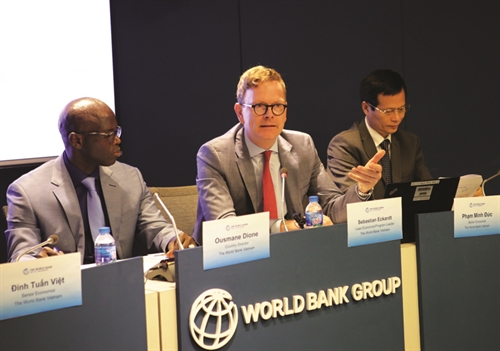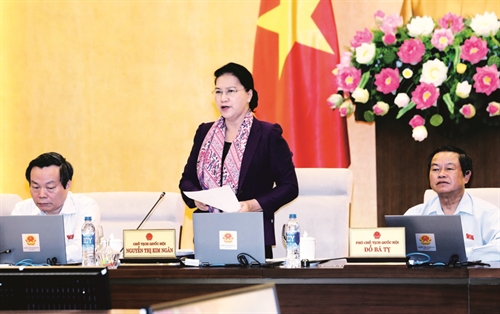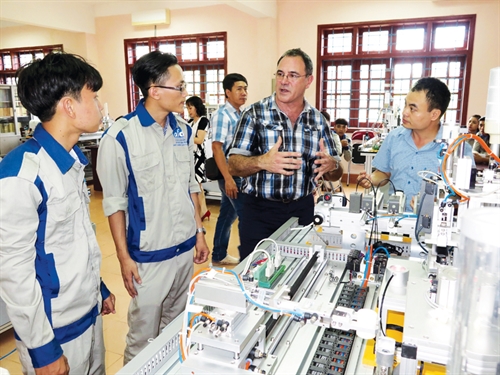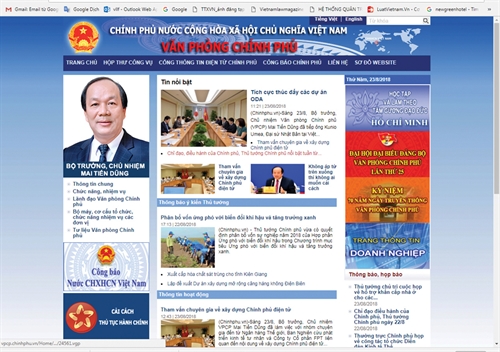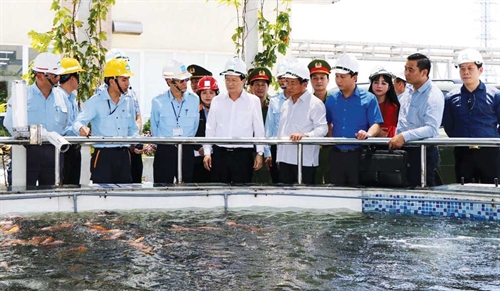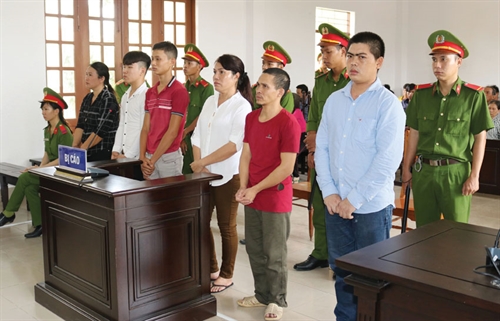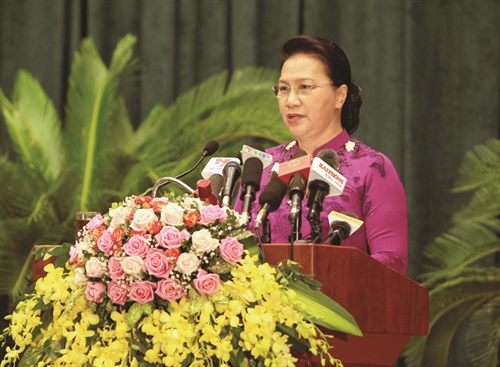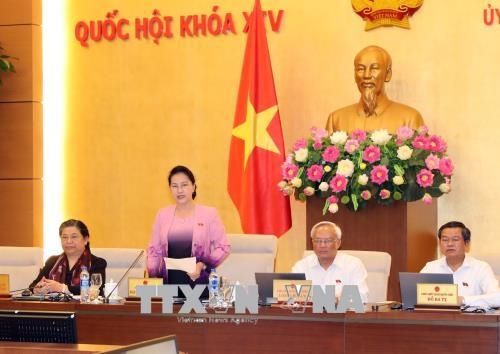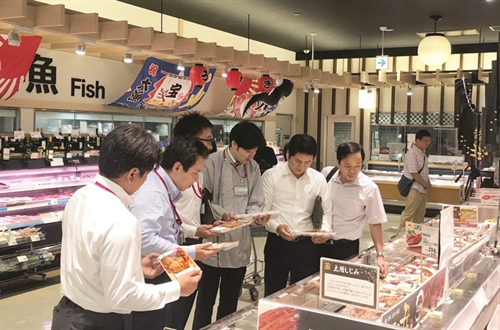National Assembly (NA) deputies on October 23 elected Nguyen Phu Trong, General Secretary of the Communist Party of Vietnam, as the President for the 2016-21 tenure during the month-long sixth session which opened on October 20 in Hanoi.
Right after the announcement of the result of the vote, the new President had a swearing-in ceremony, vowing to stay absolutely loyal to the nation, people and the Constitution of the Socialist Republic of Vietnam, and to exert every effort to complete all missions assigned by the Party, State and people.
He said that the new position is both a great honor and a heavy responsibility, and pledged to work hard to fulfill the promises he had made.
Noting that although Vietnam has reaped great achievements but is still facing many challenges, including the unpredictable developments in the world and the heavy workload inside the country, especially the preparations for the 13th National Party Congress, Trong expressed his hope for support from leaders and former leaders of the Party, State, the Vietnam Fatherland Front (VFF), NA deputies, voters and people, as well as collaboration of the NA, Government and VFF agencies, socio-political organizations, judicial bodies, and localities.
NA deputies also passed a resolution approving the dismissal of Truong Minh Tuan from the position of Minister of Information and Communications and approved the appointment of Nguyen Manh Hung, former Chairman and Director General of Viettel Military Industry and Telecoms Group as Tuan’s replacement.
Later, the NA approved a list of 48 persons for confidence voting who are holders of titles elected or ratified by the NA. This list does not include Party General Secretary and President Nguyen Phu Trong and Minister of Information and Communications Nguyen Manh Hung because they have just been elected or appointed.
The list includes Vice President Dang Thi Ngoc Thinh, Chairwoman Nguyen Thi Kim Ngan, four vice chairpersons, 12 chairpersons of the Committees, and Secretary General of the NA, Prime Minister Nguyen Xuan Phuc, five deputy prime ministers and 20 ministers, Chief Justice of the Supreme People’s Court, Procurator General of the Supreme People’s Procuracy, and Auditor General of the State Audit Office of Vietnam.
According to the result of the vote of confidence, NA Chairwoman Nguyen Thi Kim Ngan earned the highest rate of “high confidence” which was 90.1 per cent. The rate for “confidence” was 7.01 per cent.
Meanwhile, 81.03 percent of NA deputies gave Prime Minister Nguyen Xuan Phuc “high confidence” votes and 14.2 percent cast their “confidence” votes on him.
Vice President Dang Thi Ngoc Thinh got “high confidence” rating in 66.5 percent of votes and “confidence” by 30.1 percent of votes.
Minister of Education and Training Phung Xuan Nha scored the lowest confidence, with 28.87 percent of “high confidence” votes, 40 percent of “confidence” votes and 28.85 percent of “low confidence” votes.
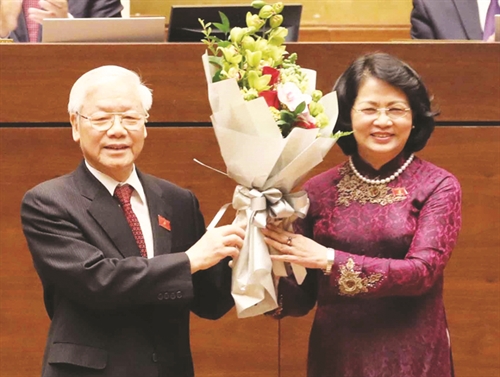 |
| Vice President Dang Thi Ngoc Thinh hands a bouquet of congratulations flowers to Party General Secretary Nguyen Phu Trong after he swears in as President__Photo: VNA |
Remarkable socio-economic progress recorded
Vietnam has seen significant socio-economic progress over the past time, Prime Minister Nguyen Xuan Phuc said at a group discussion on the matter.
He said people’s living standards have been improved, the domestic currency value stable, and national reputation in the global stage increased.
However, the Government leader pointed to shortcomings detailed in the Government report, saying more attention should be paid to social issues alongside economic matters.
According to the PM, Vietnam should look for better growth driving forces and higher added value and develop science and technology amid deeper integration. He underscored the importance of tackling overlapped institutions and building a facilitating government.
Considering the private sector as a key driving force, he urged localities to exert efforts in developing different types of enterprises, attracting foreign direct investment (FDI), and connecting the FDI and private sectors.
About state budget management, he said over-borrowing for development will result in numerous risks, including rising public debts.
Phuc said loans have been used more effectively over the past time, and recommended the fight against corruption must take place at all levels and in all sectors in a serious manner.
The Government leader noted dialogue is an important channel to help people know their concerns and suggestions are acknowledged and heard, adding that if authorities could mobilize the grassroots in monitoring and accelerating good deeds campaigns, things would be done economically.
He affirmed that the Government will listen to and collect feedback from the people in order to boost its working quality in 2019.
Earlier, after hearing a report on the country’s socio-economic situation this year and the development plan for 2019, most of the deputies said the impressive GDP growth and the fulfillment of all the 12 targets set for this year by the legislature will be bright spots in the country’s socio-economic picture.
According to the report, the gross domestic product (GDP) grew by 6.98 percent in the first nine months of 2018, and the whole year’s figure is expected to be higher than the NA’s target of 6.7 percent, compared to the target of 6.5-7 percent for 2016-21.
Consumer price index (CPI) can be kept at below 4 percent, making 2018 the third straight year the CPI is under 4 percent.
From 2016 to 2018, remarkable improvements have been recorded in economy, culture, society, environment, defense, security, and external relations.
During the period, the size of Vietnam’s economy has increased by 1.3 folds while the per-capita GDP has risen by 440 USD, and people’s living standards.
The development investment during 2016-18 is estimated at 33.5 percent of GDP and falls within the target of 32-34 percent for the 2016-20 period.
The socialist-oriented market economic institution is gradually getting completed, while the business and investment environment has been improved, thus helping enterprises overcome difficulties.
The structure of human resources has been shifted from agriculture to industry and services, and the Prime Minister has taken a lot of measures to create favorable conditions for enterprises, including stepping dialogue, and cutting unnecessary administrative procedures.
Diplomatic work has also shown progress, thus helping expand economic partnership in investment cooperation and product consumption. At the same time, public investment has been tightened, which creates a momentum for economic development in the time to come, reads the report.
CPTPP to be ratified
At this session, the NA is expected to pass nine draft laws and debate other six draft laws. The to-be-passed draft laws are those relating to corruption prevention and control, the People’s Public security force, special amnesty, higher education, Vietnam’s coast guard, protection of state secrets, animal husbandry, cultivation, and planning.
The NA will also consider and approve a draft resolution ratifying the Comprehensive and Progressive Trans-Pacific Partnership (CPTPP) Agreement and relevant documents.
* At its 28th session held on October 15-17 in Hanoi, the NA Standing Committee decided to prolong the pilot e-visa program for foreign visitors to Vietnam by another two years until February 1, 2021.
On the implementation of the pilot program, Deputy Minister of Public Security Le Quy Vuong said the policy has contributed to attracting foreigners to Vietnam for tourism and investment purposes, creating a driving force for the tourism sector.
Between February 2017 and August 31, 2018, Vietnam had granted 298,113 e-visas, with 241,875 e-visa holders having entered the country.
Vuong said many diplomatic missions of foreign countries in Vietnam applauded the policy, saying it facilitates the nation’s external diplomacy amid global integration.
The official pointed to some existing shortcomings, which include the small number of e-visa holders entering Vietnam due to ineffective popularization of the policy, and the large number of countries yet to be subject to the policy.- (VLLF)
